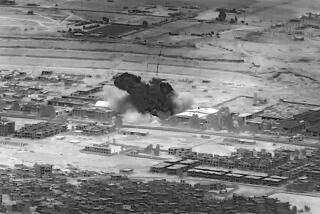Fallouja Talks Take Turn for the Better, U.S. Says
- Share via
FALLOUJA, Iraq — After threatening for days to storm insurgents in this mortar-shell-scarred city, U.S. forces Sunday reported signs of progress toward a peaceful settlement and announced that American troops and Iraqi Civil Defense Corps members would begin joint neighborhood patrols this week.
The shift in tenor underscored the complexities U.S. forces face in showing resolve against insurgents while trying to avoid another round of bloodshed that could incite new uprisings across the nation. Brig. Gen. Mark Kimmitt, deputy director of U.S. operations in Iraq, said positive signs were emerging from negotiations and the military would practice “combat patience.”
Sporadic fighting and explosions echoed across Iraq on Sunday. The nation’s Oil Ministry announced that production was halted at a main oil terminal in the Persian Gulf after Saturday’s suicide attack by three small boats that killed two U.S. sailors and a Coast Guardsman.
In an incident that could rile passions in Baghdad, U.S. forces are investigating a shootout downtown between troops and rooftop gunmen. The gunfight started near Martyrs’ Monument after a roadside bomb killed an American. Troops carried the soldier away from the scene. When they returned, children were taking items from their vehicle. Kimmitt said the unit was then attacked by small-arms fire from the tops of buildings. There were Iraqi casualties, but it was not clear whether children were among them.
The quagmire in Fallouja is testing the patience of the military as negotiators from the American-backed Iraqi Governing Council attempt to persuade insurgents to lay down their heavy weapons and allow city government offices to reopen. U.S. forces have stated that they would wait “days, not weeks” before launching a sweeping offensive. But Kimmitt softened his rhetoric Sunday, saying, “We remain committed to the political track.”
U.S. forces said they were encouraged by negotiations and that joint teams of American and Iraqi forces would begin patrolling industrial neighborhoods in the eastern and northeastern parts of the city beginning at noon Tuesday. Anyone carrying a weapon inside Fallouja after that would be “considered hostile,” Kimmitt said.
The agreement was announced as 67 families were allowed to return to the city and a day after Bremer visited the area and promised at least $20 million in economic aid.
The two-track U.S. strategy of threatening a major attack while working diplomatic channels with tribal and local leaders is unfolding while the cease-fire around the city is repeatedly broken and insurgents -- numbering as many as 2,000 -- have not given up their caches of heavy weapons.
Kimmitt said Sunday that the cease-fire was broken 13 times over 24 hours and that U.S. forces surrounded a house and killed 25 insurgents after seeing a man run into the building with a mortar tube.
Despite that confrontation, Kimmitt said: “The coalition is showing a tremendous amount of flexibility. That patience is not everlasting.”
Lt. Col. Gregg Olson, commander of the 2nd Battalion, 1st Regiment of the 1st Marine Division, was buoyed by news that Marines would start joint patrols in Fallouja.
“Every time we interact with the Iraqi people, it’s positive,” he said. “When we remain faceless outsiders it makes it difficult for people to understand what our mission is.”
Joint patrols, he said, will break down suspicion among Iraqis.
“We understand there is a lot of misunderstanding about why the American forces are here,” Olson said. “We want to show the Iraqi people that we’re here to help them.”
Until last month’s killing of four American contractors led to a more aggressive U.S. approach, joint patrols were part of the Marine plan for the volatile Sunni Triangle area, which includes Fallouja, when they assumed responsibility for much of the region from the Army’s 82nd Airborne Division. The Marines have ringed the city since April 5 and have six battalions in the area.
Hachim Hassani, the interim member of the Iraqi Governing Council who brokered the cease-fire, said he was concerned about what would happen if U.S. forces were fired upon while on joint patrols.
“We hope U.S. soldiers will not be attacked when they enter the city,” he said. “If they are attacked they will respond, and this will lead to problems.”
Along with getting Iraqi security forces patrolling the streets, the Marines are trying to piece together the city’s shattered judicial system. The city’s judges also fled when fighting began; even before that, the system was swamped by rampant criminality and intimidation of investigators and judges.
“Right now, there is nothing in place,” said Capt. Kevin Coughlin, the 2nd Battalion’s staff judge advocate.
Farther south in the Persian Gulf, the U.S. 5th Fleet tightened security around two offshore oil terminals that were the targets of three boats loaded with bombs Saturday evening. The U.S. is not sure if the boats -- a dhow and two speedboats -- came from Iraq, Iran or Kuwait. The apparently coordinated operation was reminiscent of the terrorist attack on the U.S. Navy destroyer Cole in Yemen in 2000.
The dhow was heading toward the Khor al Amaya terminal about 15 miles offshore when a rubber boat from the coalition attempted to intercept it. The dhow exploded, killing two sailors and a Coast Guardsman.
The speedboats headed toward the Basra terminal about 19 miles offshore but blew up before reaching the site. The Khor al Amaya terminal resumed oil operations Sunday, and the Basra site, which experienced power outages, was expected to go back on line today.
*
Times staff writers Patrick J. McDonnell and Nicholas Riccardi and special correspondent Suhail Ahmed contributed to this report.
More to Read
Sign up for Essential California
The most important California stories and recommendations in your inbox every morning.
You may occasionally receive promotional content from the Los Angeles Times.













